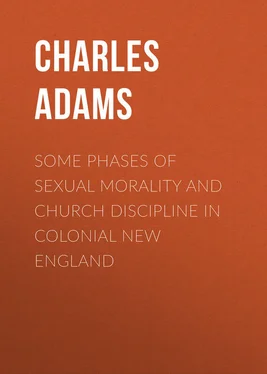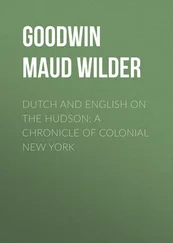Charles Adams - Some Phases of Sexual Morality and Church Discipline in Colonial New England
Здесь есть возможность читать онлайн «Charles Adams - Some Phases of Sexual Morality and Church Discipline in Colonial New England» — ознакомительный отрывок электронной книги совершенно бесплатно, а после прочтения отрывка купить полную версию. В некоторых случаях можно слушать аудио, скачать через торрент в формате fb2 и присутствует краткое содержание. Жанр: foreign_antique, foreign_prose, на английском языке. Описание произведения, (предисловие) а так же отзывы посетителей доступны на портале библиотеки ЛибКат.
- Название:Some Phases of Sexual Morality and Church Discipline in Colonial New England
- Автор:
- Жанр:
- Год:неизвестен
- ISBN:нет данных
- Рейтинг книги:4 / 5. Голосов: 1
-
Избранное:Добавить в избранное
- Отзывы:
-
Ваша оценка:
- 80
- 1
- 2
- 3
- 4
- 5
Some Phases of Sexual Morality and Church Discipline in Colonial New England: краткое содержание, описание и аннотация
Предлагаем к чтению аннотацию, описание, краткое содержание или предисловие (зависит от того, что написал сам автор книги «Some Phases of Sexual Morality and Church Discipline in Colonial New England»). Если вы не нашли необходимую информацию о книге — напишите в комментариях, мы постараемся отыскать её.
Some Phases of Sexual Morality and Church Discipline in Colonial New England — читать онлайн ознакомительный отрывок
Ниже представлен текст книги, разбитый по страницам. Система сохранения места последней прочитанной страницы, позволяет с удобством читать онлайн бесплатно книгу «Some Phases of Sexual Morality and Church Discipline in Colonial New England», без необходимости каждый раз заново искать на чём Вы остановились. Поставьте закладку, и сможете в любой момент перейти на страницу, на которой закончили чтение.
Интервал:
Закладка:
Some Phases of Sexual Morality and Church Discipline in Colonial New England
In the year 1883 I prepared a somewhat detailed sketch of the history of the North Precinct of the original town of Braintree, subsequently incorporated as Quincy, which was published and can now be found in the large volume entitled “History of Norfolk County, Massachusetts.” In the preparation of that sketch I had at my command a quantity of material of more or less historical value, – including printed and manuscript records, letters, journals, traditions both oral and written, etc., – bearing on social customs, and political and religious questions or conditions. The study of this material caused me to use in my sketch the following language: —
“That the earlier generations of Massachusetts were either more law-abiding or more self-restrained than the later, is a proposition which accords neither with tradition nor with the reason of things. The habits of those days were simpler than those of the present; they were also essentially grosser. The community was small; and it hardly needs to be said that where the eyes of all are upon each, the general scrutiny is a safeguard to morals. It is in cities, not in villages, that laxity is to be looked for.” But “now and again, especially in the relations between the sexes, we get glimpses of incidents in the dim past which are as dark as they are suggestive. Some such are connected with Quincy… The illegitimate child was more commonly met with in the last than in the present century, and bastardy cases furnished a class of business with which country lawyers seem to have been as familiar then as they are with liquor cases now.” 1 1 History of Norfolk County, Massachusetts, p. 231.
Being now engaged in the work of revising and rewriting the sketch in which this extract occurs, I have recently had occasion to examine again the material to which I have alluded; and I find that, though the topic to which it relates in part is one which cannot be fully and freely treated in a work intended for general reading, yet the material itself contains much of value and interest. Neither is the topic I have referred to in itself one which can be ignored in an historical view, though, as I have reason to believe, there has been practised in New England an almost systematic suppression of evidence in regard to it; for not only are we disposed always to look upon the past as a somewhat Arcadian period, – a period in which life and manners were simpler, better and more genuine than they now are, – not only, I say, are we disposed to look upon the past as a sort of golden era when compared with the present, but there is also a sense of filial piety connected with it. Like Shem and Japhet, approaching it with averted eyes we are disposed to cover up with a garment the nakedness of the progenitors; and the severe looker after truth, who wants to have things appear exactly as they were, and does not believe in the suppression of evidence, – the investigator of this sort is apt to be looked upon as a personage of no discretion and doubtful utility, – as, in a word, a species of modern Ham, who, having unfortunately seen what ought to have been covered up, is eager, out of mere levity or prurience, to tell his “brethren without” all about it.
On this subject I concur entirely in the sentiments of our orator, Colonel Higginson, as expressed in his address at the Society’s recent centennial. The truth of history is a sacred thing, – a thing of far more importance than its dignity, – and the truth of history should not be sacrificed to sentiment, patriotism or filial piety. Neither, in like manner, when it comes to scientific historical research, can propriety, whether of subject or, in the case of original material, of language, be regarded. To this last principle the published pages of Winthrop and Bradford bear evidence; and, in my judgment, the Massachusetts Historical Society has, in a career now both long and creditable, done nothing more creditable to itself than in once for all, through the editorial action of Mr. Savage and Mr. Deane, settling this principle in the publications referred to. I am, of course, well aware that Mr. Savage did not edit Winthrop’s History for this Society, but nevertheless he is so identified with the Society that his work may fairly be considered part of its record. Whether part of its record or not, Mr. Savage and Mr. Deane, – than whom no higher authorities are here recognized, – in the publications referred to, did settle the principle that mawkishness is just as much out of place in scientific historical research as prurience would be, or as sentiment, piety and patriotism are. These last-named attributes of our nature, indeed, – most noble, elevating and attractive in their proper spheres, – always have been, now are, and I think I may safely say will long continue to be, the bane of thorough historical research, and ubiquitous stumbling-blocks in the way of scientific results.
But in the case of history, as with medicine and many other branches of science and learning, there are, as I have already said, many matters which cannot be treated freely in works intended for general circulation, – matters which none the less may be, and often are, important and deserving of thorough mention. Certainly they should not be ignored or suppressed. And this is exactly one of the uses to which historical societies are best adapted. Like medical and other similar associations, historical societies are scientific bodies in which all subjects relating to their department of learning both can and should be treated with freedom, so that reference may be made, in books intended for popular reading, to historical-society collections as pure scientific depositories. It is this course I propose to pursue in the present case; and such material at my disposal as I cannot well use freely in the work upon which I am now engaged, will be incorporated in the present paper, and made accessible in the printed Proceedings of the Society for such general reference as may be desirable.
Among the unpublished material to which I have referred are the records of the First Church of Quincy, – originally and for more than a century and a half (1639-1792) the Braintree North Precinct Church. The volume of these records covering the earliest period of the history of the Society cannot now be found. It was in the possession of the church in 1739, for it was then used and referred to by the Rev. John Hancock, father of the patriot, and fifth pastor of the church, in the preparation of two centennial sermons preached by him at that time; but eighty-five years later, when, in 1824, the parish was separated from the town, the earliest book of regular records then transferred from the town to the parish clerk went no farther back than Jan. 17, 1708.
There is, however, another volume of records still in existence, apparently not kept by the regular precinct clerk, the entries in which, all relating to the period between 1673 and 1773, seem to have been made by five successive pastors. Small and bound in leather, the paper of which this volume is made up is of that rough, parchment character in such common use during the last century, and the entries in it, in five different handwritings, are in many cases scarcely legible, and frequently of the most confidential character. In the main they are records of births, baptisms, marriages and deaths; but some of them relate to matters of church discipline, and these throw a curious light on the social habits of a period now singularly remote. In view of what this volume contains, the loss of the previous volume containing the record of the church’s spiritual life from the time it was organized to 1673, a period of thirty-four years, becomes truly an hiatus valde deflendus
Читать дальшеИнтервал:
Закладка:
Похожие книги на «Some Phases of Sexual Morality and Church Discipline in Colonial New England»
Представляем Вашему вниманию похожие книги на «Some Phases of Sexual Morality and Church Discipline in Colonial New England» списком для выбора. Мы отобрали схожую по названию и смыслу литературу в надежде предоставить читателям больше вариантов отыскать новые, интересные, ещё непрочитанные произведения.
Обсуждение, отзывы о книге «Some Phases of Sexual Morality and Church Discipline in Colonial New England» и просто собственные мнения читателей. Оставьте ваши комментарии, напишите, что Вы думаете о произведении, его смысле или главных героях. Укажите что конкретно понравилось, а что нет, и почему Вы так считаете.












